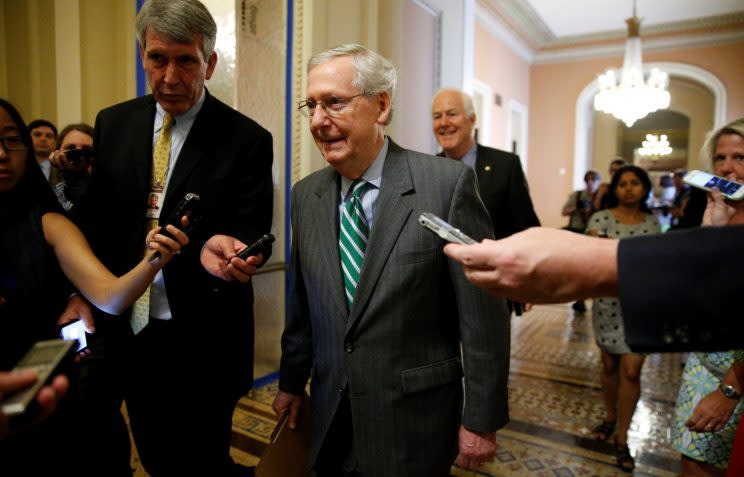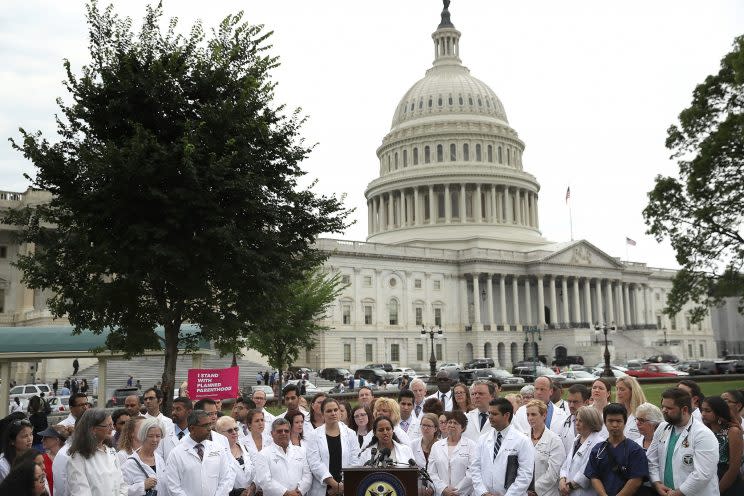CBO likely to say millions lose coverage under Senate health care bill

WASHINGTON — The nonpartisan Congressional Budget Office is likely to say this week that the Senate health care bill would result in millions fewer Americans having health insurance, potentially foiling Senate Majority Leader Mitch McConnell’s plan to rush the sweeping legislation to the floor before July 4.
The CBO previously ignited a firestorm when it predicted that the House’s version of health care reform would result in 23 million fewer Americans having health insurance in 2026 compared to current law. That report was released after the House voted for the legislation. A report on the Senate Republicans’ legislation could come as early as Monday.
Health care experts from across the political spectrum told Yahoo News they believe that the Senate version of the bill would result in slightly less catastrophic coverage numbers, but they still expect the CBO to predict widespread coverage loss.
“I’d expect coverage to be 18-20 million fewer than [under Obamacare],” said Avik Roy, a conservative health care policy analyst who supports the Senate bill. Roy added that he “strongly” disagrees with that projection, and that he would score the legislation differently than the CBO.
Gary Claxton, the director of the health care marketplace program at the nonprofit Kaiser Family Foundation, said he believed the CBO would predict “15 or more million” would lose coverage.
The Center for American Progress, a liberal think tank, estimated in one analysis that between 15 million and 23 million people would lose coverage under the Senate plan. Former presidential candidate Hillary Clinton touted that estimate on Twitter, writing: “Forget death panels. If Republicans pass this bill, they’re the death party.”
Such predictions are likely to spook undecided key Senate moderates such as Sens. Susan Collins, R-Maine, and Lisa Murkowski, R-Alaska, who have said the CBO’s uninsured numbers will be important in how they decide whether to support the bill or not. A pro-Obamacare group already ran attack ads targeting both senators and other moderates using the numbers from the CBO’s dismal score of the House bill.
Last week, Collins called the CBO analysis “all important” and said she cannot support a bill that causes tens of millions of Americans to lose coverage.
“I want to wait to see the CBO analysis, but I have very serious concerns about the bill,” she said on ABC’s “This Week” Sunday.

Sen. Dean Heller, R-Nev., announced his opposition to the legislation last Friday, saying it would cause too many Nevadans to lose coverage. But four Senate conservatives — Sens. Rand Paul, R-Ky., Mike Lee, R-Utah, Ron Johnson, R-Wis., and Ted Cruz, R-Texas — have said they’re not backing the bill unless it moves to the right. McConnell needs at least 50 of his caucus’ 52 Republicans to support the bill for it to pass, and any policy shift to appease the conservative holdouts could cause more moderate GOP lawmakers to balk.
Still, if the CBO shows a modest decrease in the uninsured rate compared to the House bill, it’s possible Senate Republican leaders will argue that the legislation is moving in a positive direction to convince wavering members. They could also quibble with how the CBO scored it, discrediting the nonpartisan analysis. Health and Human Services Secretary Tom Price said in an interview on Sunday that the CBO is “not accurate.”
The Senate plan’s tax credits are more generous than the House bill’s, which means the CBO will likely show fewer Americans will lose coverage under it. Both plans’ subsidies are less generous than current law. The Senate bill’s tax credits are tied to the cost of insurance plans that are sold on the marketplace, so premium cost increases can’t outpace them.
But the Senate bill, like the House bill, repeals the individual mandate that requires Americans to have insurance coverage or pay a tax — a move that the CBO has in the past predicted would have a big impact on insured rates.
“The big change will be repealing the individual mandate, which the CBO, and the [Centers for Medicare and Medicaid Services] actuary, think will make a big difference in increasing the uninsured,” said Timothy Jost, a health care expert and emeritus professor at Washington and Lee University School of Law.
Some Democrats are arguing that the CBO score will underestimate how many people would lose coverage long-term due to changes in Medicaid that won’t take effect until 2025. That’s the year when the Senate bill proposes tying the increase in Medicaid funding to inflation instead of the rise in overall medical costs. The Urban Institute estimates that change alone could result in a dramatic $467 billion cut in Medicaid funds over 10 years compared to the House bill, which already cuts funding by a significant amount.
Sen. Tammy Duckworth, D-Ill., wrote a letter to the CBO Friday asking that the analysts score the bill on a 20-year timeline instead of a 10-year timeline, to reveal those cuts.
“I know we’re going to get a horrific CBO score next week,” MIT professor Jonathan Gruber, who helped design Obamacare, said Sunday on MSNBC. “The CBO score will be horrible, but it won’t be as bad as the House bill, because the Senate is cheating by pushing the damage out by a few years.”
Roy disputed that characterization, saying he does not believe the Senate’s Medicaid reform will result in fewer people having health insurance.
Read more from Yahoo News:



